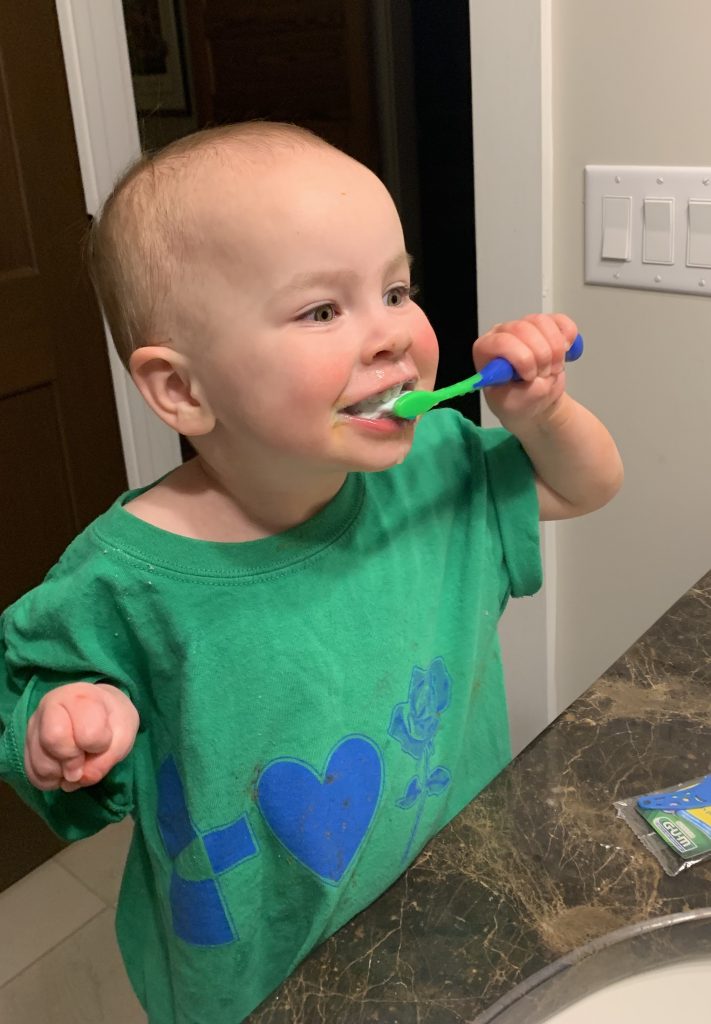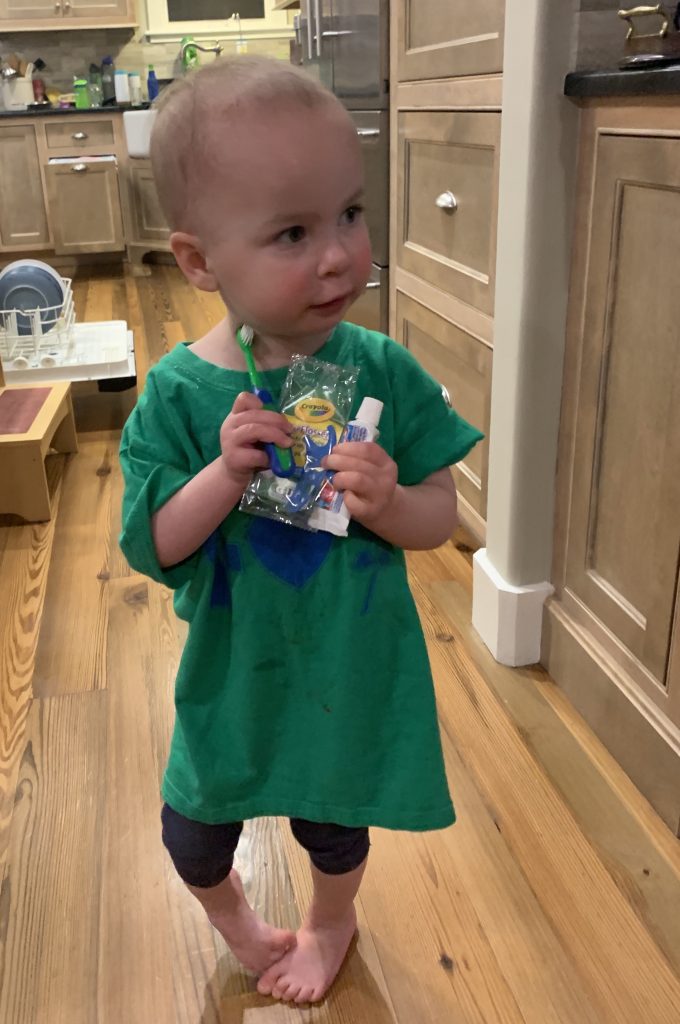A couple of weeks ago my 3 year old daughter came home from preschool with a small plastic bag full of dental hygiene products. She was so excited to show me her new toothbrush, toothpaste and floss. Vivian LOVES to brush her teeth. SHE will make sure it happens at least twice a day. So, I can only imagine her excitement when an educator from a dental office came to talk to her class.

When I came home from work, my babysitter, Kate, did the “handoff” and updated me about their afternoon. She let me know that Vivian’s teacher had told her about the classroom visit from the dentist’s office and that they learned about “healthy” and “unhealthy’ foods. She told me with a bit of a grimace on her face because she knew how I would feel about that.
Adult Concepts, Taught to Young Children
This is an example of age-inappropriate nutrition education. It doesn’t make sense to tell young children what they need to be eating. My daughter is 3 years old. She eats what I put in front of her. Well, not everything I put in front of her, but she doesn’t have a say in what I buy or give her to eat. She doesn’t go to the grocery store and I would never want her to be fearful of a food I give her. Can you imagine a 3 year saying, “I can’t eat that Mommy, the dentist said it’s unhealthy?”
Furthermore, age-inappropriate nutrition education causes our children harm. When we tell children certain foods are good or bad, healthy or unhealthy, red light or green light, “go” or “whoa” foods, we are trying to teach them an abstract concept in a concrete way. You and I can understand that a food high in sugar may increase one’s risk for tooth decay (depending on several factors), and we can also understand it’s ok to eat foods sometimes with sugar in them. They are not foods to fear. However, its an abstract concept to understand the complexities of this. A 3 year old doesn’t have the ability to understand abstract concepts and nutrition is very abstract. Young children may hear this lesson and become fearful of the foods that the educator deemed as “unhealthy.” Sensitive children may stop eating adequately because of this fear of food. Sometimes, I think that our method of nutrition education is to scare the child so much that they say something to their parent. We think we can get the message to the parent by instilling fear in the child.
Vivian’s bag from the dental educator did include a handout about nutrition. It is appropriate to provide this health education directly to the parent. The parent could then assess how or if they are going to implement this information in their family feeding.

After I heard this frustrating news and had a “Mommy Bear” reaction of wanting to shield her from fear-based nutrition education, I reached out to my colleagues who understand the complexities of age-appropriate nutrition information. I was reaching out for support and for people to commiserate with me. However, our discussion was much more than that. It was fascinating to discuss the topic of food, shame and dental care and the parallels with weight-based medical treatment became clear us.
Genetics Plays a Role in Cavities
My two older children have two different experiences when they go to the dentist. My oldest child brushes her teeth religiously, much more than my middle child. She has had several cavities and always gets many questions from her dentist about what she eats. Does she eat sugary cereal? Gummies? Lots of candy? My middle child gets served the exact same food as my oldest child, brushes less and has never had a cavity. He typically doesn’t get questioned about his food intake. It’s clear to me, and from what I understand, people’s teeth and mouth environment can be more or less susceptible to plaque and, thus, cavity development. Factors that affect this susceptibility are largely out of their control.
Several of the dietitians that I contacted about my frustration with the preschool dental education began to share their own experiences with going to the dentist. A couple of these dietitians shared that no matter how much they brushed and flossed, they would go to the dentist as a child and young adults and feel shame that they didn’t clean their teeth well enough. They would dread going to the dentist. The dentist would ask them a million questions about how much they were brushing and flossing and what they were eating because of the amount of plaque and cavities they had. It wasn’t until they were adults and/or changed dentists that they understood that the cavities weren’t their fault. Some people are more susceptible to cavities. No amount of brushing or flossing will totally prevent cavities in some people. They were shamed because of factors that were outside of their control — genetics, oral environment, water supply, and deep grooves in their teeth.
Genetics Plays a Role in Weight
The parallel between how they felt going to the dentist and how children (and adults!) in large bodies often feel going to the doctor became clear to us. Children in large bodies go to the doctor’s office and, because of their weight, are often drilled about what they eat. They may be instructed to make certain changes to their eating and if their weight doesn’t change, they may feel shame about going back to the doctor. Children in large bodies often dread going to the doctor. Children in smaller bodies are much less likely to experience this.
The truth is body size is mostly determined by genetics, just as someone’s oral environment and susceptibility to cavities is. Research shows us that kids in larger bodies do not eat more than children in smaller bodies. Yes – you read that right. Children at the upper end of the growth charts as a whole do not eat more than children on the lower end of the growth curves. As a medical field, our “solution” for kids who have larger bodies is to tell them to eat less but they are typically not eating differently than their thinner peers. Genetics and someone’s zip code, factors outside of children’s control, are much more predictive of body size than anything else. Just like my son doesn’t eat differently than my older daughter and he doesn’t get cavities, some children have larger bodies and their genetics, not diet, determine that. A focus on weight and restricting one’s intake by the doctor, sets up children in larger bodies for shame, dieting, weight cycling and avoiding the doctor, all things that lead to health problems.
Focus on Evidence-Based Health Care
What if instead, as medical providers, dentists, dietitians, doctors, and nurses, we approached our work from an evidence-based philosophy, including giving age appropriate education to children and adult appropriate education to parents? What if we stopped shaming children for factors that they have no control over? What if we focused on behaviors that enhance health, not weight loss or fear-based messages that cause health problems? What if we reduced the dread that many people feel coming to see us? We can do better.






Anna you are a gift. Thank you for this wonderful article and for the work you are doing daily to help our kids grow up competent eaters.
HI Jessica, Elizabeth here. I will be sure to pass your kind words on to Anna. We both think the world of you! Thank YOU for your support.
Great article! Thanks so much for sharing it!
You’re welcome!